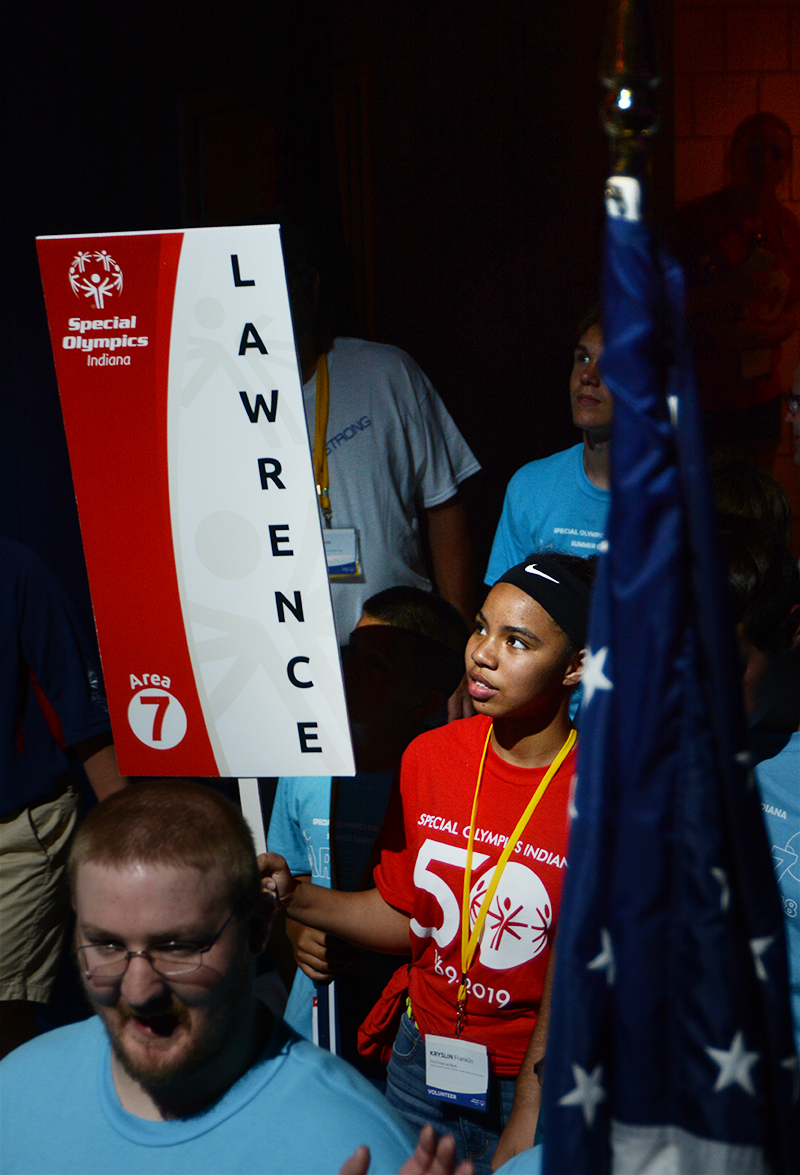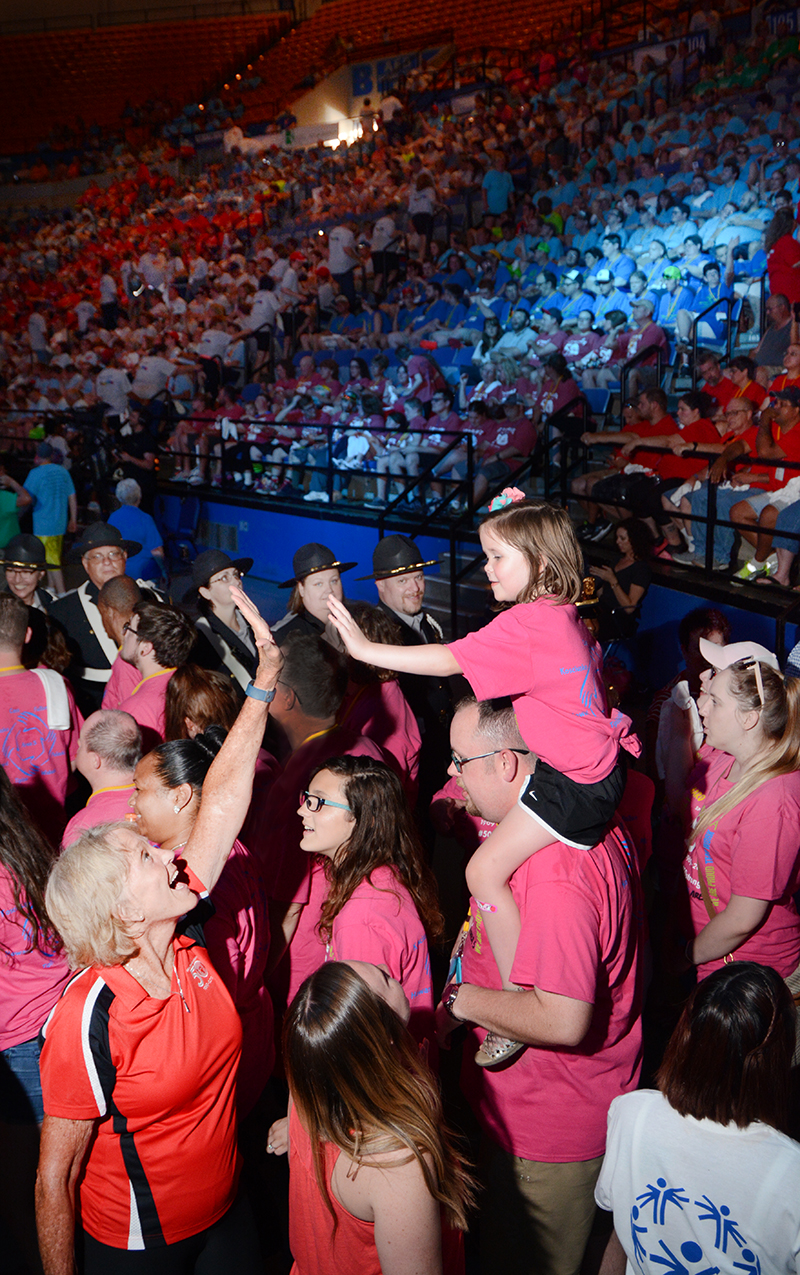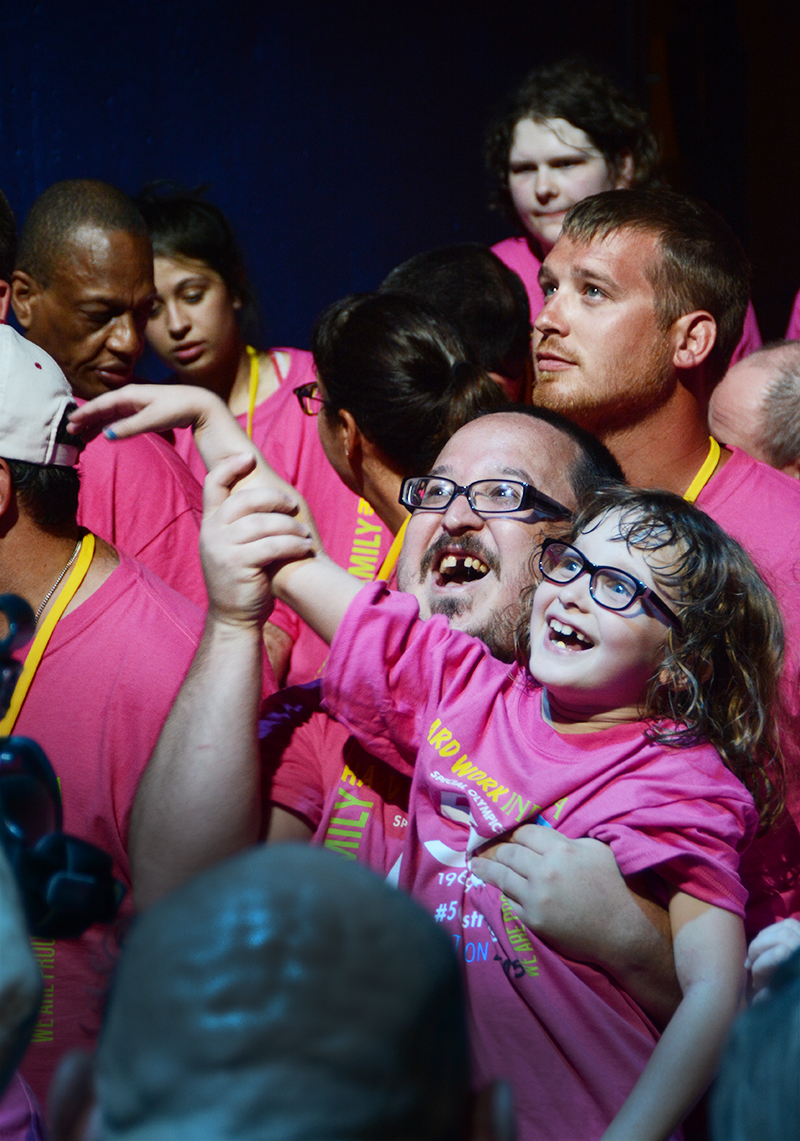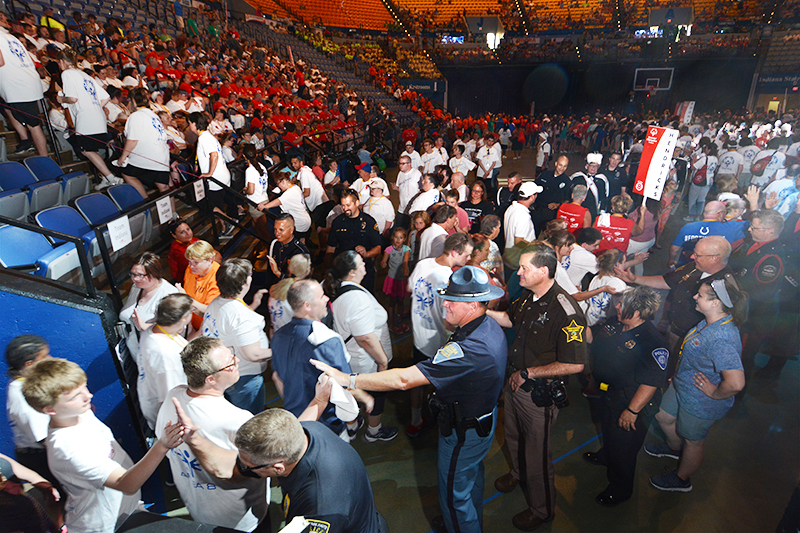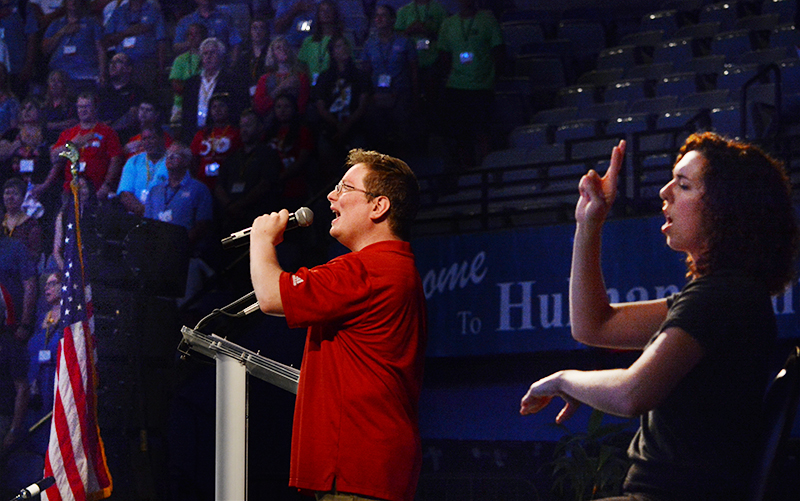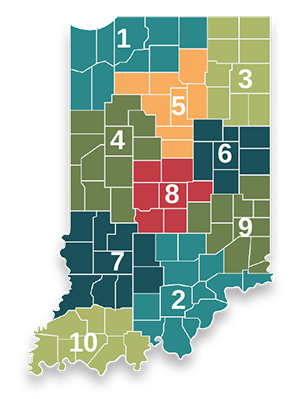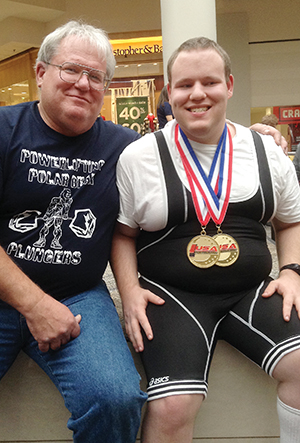
Tim and David Paul share a smile after David won two gold medals in a powerlifting competition. Born four months premature and weighing less than 2 pounds, David has overcome immeasurable challenges — with his dad Tim by his side the entire way.
Photo courtesy of Tim Paul
You can hardly call yourself a “Hoosier” if you’ve not heard of the “Milan Miracle” — the David and Goliath tale of the tiny Indiana high school that won the 1954 state basketball championship and inspired the movie “Hoosiers.”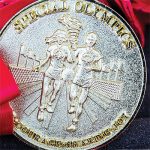
But there’s another Milan miracle. It’s about another David.
And it’s just as amazing.
It’s the story of David Paul, a 2014 Milan High School graduate.
Born four months premature, David seemingly was not long for the world. His doctors gave him less than a 10 percent chance of survival. They diagnosed a myriad of maladies affecting his brain and other organs caused by the prematurity. His birth weight was less than 2 pounds.
In the vernacular used by his grocer dad: David in the fetal position would have fit inside a 2-liter bottle of soda. “If you were to pick up a 20-ounce loaf a bread, that would have been his body weight,” said David’s dad, Tim Paul, who works for his brother at the IGA in Oldenburg. “David’s footprint would have fit inside a quarter.”
Today, David’s footprint is figuratively Goliath sized. Due to his dad’s diligence in developing and coaching him, and Special Olympics for providing the platform and opportunity, David is able to stand tall on his own as a 22-year-old gold medal-winning powerlifter. Despite having cerebral palsy and a malformed femur and being told he’d never walk, the Southeastern Indiana REMC consumer will be representing Indiana in the Special Olympics USA Games this month in Seattle.
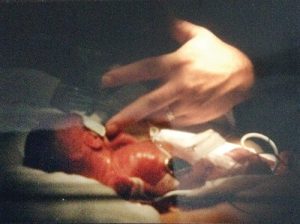
Tim Paul reaches his hand into his son’s incubator at Good Samaritan Hospital in Cincinnati to touch his tiny son, David. David was born four months premature, and was fighting for his life.
David’s story of never giving up and working to overcome the health challenges hurled his way exemplifies what Special Olympics is all about.
As a powerlifter, David has bench-pressed 235 pounds. He has dead-lifted 254 pounds — which requires raising the barbell from the floor and standing erect with knees locked and back straight. And he has back-squatted 133 pounds — which requires the lifter to put the bar on his back, step into a set position, then drop down into a full squat and come back up.
This means the once 20-ounce preemie, who is also legally blind and has an intellectual disability, is now able to lift over 150 to 180 times his birth weight in two events. That would be like a 22-year-old weighing in at the average 7.5 pounds at birth now lifting over 1,000 pounds.
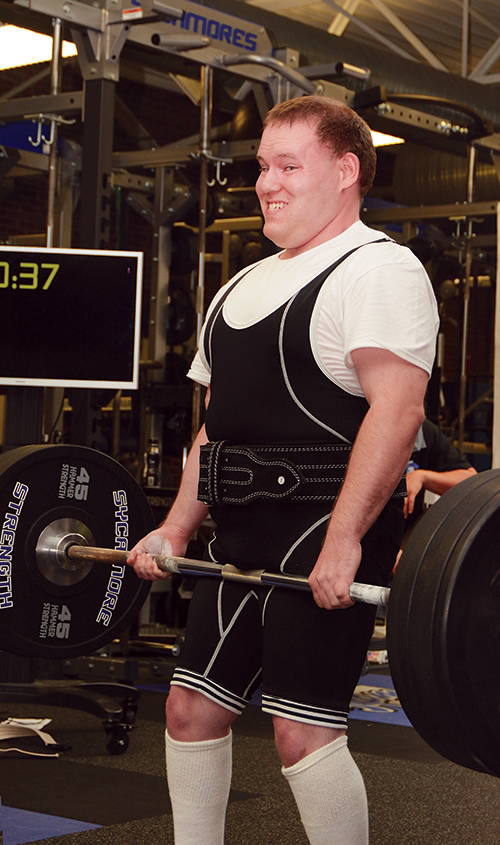
Today, David, though dealing with intellectual and physical challenges from his premature start in life, is a Special Olympics powerlifter able to dead lift and bench press well over 200 pounds. David competes in the dead lift component at the Indiana games last month at Indiana State University in Terre Haute.
“Everybody talks about that Milan basketball team,” said his proud dad and coach. “But I say I’ve got a miracle that’s just as big and inspirational as there ever has been in Milan.”
Miracles among us
How many other miracles like David Paul are out there because of Special Olympics?
For a half century, Special Olympics has been striking down the old derogatory terms of the past and redefining what it means to be “intellectually disabled” for millions of people around the globe. It has helped them leap the barriers of stereotypes and prejudice. It has helped find and refine the gold shining within these individuals society once cast aside into the shadows.
Special Olympics marks its golden anniversary this month with a celebration in Chicago where the first Special Olympics games were held July 20, 1968 (please scroll down to see sidebars below, including photos from Indiana’s summer games last month in Terre Haute).
The global organization provides year-round athletic training and competition in a full range of sports for children and adults with intellectual disabilities. Its goals are to transform their lives through the power and joy of sports and empower them to become accepted and valued members of their communities.
“Whether it’s high school, college, youth league stuff or Special Olympics, sports has a transformative power to change people’s attitudes,” said Jeff Mohler, president and CEO of Special Olympics Indiana. “Special Olympics uses that platform … to be able to talk to people about the value of somebody with a disability.”
Founded in 1968 by Eunice Kennedy Shriver, the Special Olympics movement has grown to more than 5.7 million athletes and Unified partners in 172 countries. In the United States, over 700,000 athletes and Unified partners from 52 state programs participate in sports offered at the national, regional, state, local and area levels.
In Indiana, almost 15,000 athletes participate in 29 sports from 71 county programs.
“The concept of Special Olympics started as a day camp in [Shriver’s] backyard, but the very first event that ever was labeled a ‘Special Olympics’ was a ‘world games,’” Mohler noted. “It started from the top and trickled down. And then the fire caught on.”
Indiana was quick off the mark reacting to the Special Olympics movement. Several educators from Indiana State University attended the first Chicago games and carried the torch home to Terre Haute. They immediately developed a statewide Special Olympics organization. Indiana’s first games were held less than a year later, June 6, 1969, with a few dozen participants making them one of the — if not the — first statewide Special Olympics games.
As soon as the international 50th anniversary ends later this month with a special celebration in Chicago, Special Olympics Indiana will begin its 50th anniversary celebration which will last through 2019.
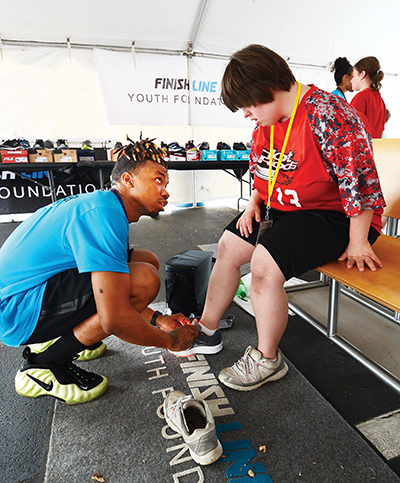
Jay Burns, an employee at a Finish Line store in Bloomington, helps Alyssa Reindorf, a volleyball player with the Ripley-Ohio-Dearborn County team, get the right fit in a new pair of shoes at the state Special Olympics games in Terre Haute in June. Athletes who participated in free health screenings during the games earned a pair of shoes donated by Finish Line.
Photo by Richard G. Biever
Indiana sets the pace
Along with its quick start, Special Olympics Indiana has innovated and created many new programs to further the progress and welfare of those it serves.
As one might expect, Indiana offers the world’s largest Special Olympics basketball program with over 250 teams and is the only Special Olympics program that has a women’s-only basketball tournament. Indiana also created a flag football program that has been adopted by about every state.
A few of the many other marquee programs include:
• Champions Together — a collaboration between the Indiana High School Athletic Association and Special Olympics Indiana that promotes servant leadership. Among the first programs of its kind in the U.S., Champions Together has grown from 13 Hoosier schools at its inception to 85 at the end of 2017.
• Athlete Leadership — which provides training and support for Special Olympians who want to expand their role both on and off the field as coaches, board members and more. “Too often, I think, our athletes are waiting for us to invite them to the board table,” Mohler said. “They need to invite us. It’s their table. And that’s a matter of our athletes continuing to learn how to be leaders in the movement.”
• Unified Sports — which teams Special Olympians with people without intellectual disabilities for training and competition in various sports.
• Healthy Athletes — which offers health services, screenings and information to address the severe health disparities faced by people with intellectual disabilities.
“Special Olympics today is very different than Special Olympics was 50 years,” Mohler said. “But, thank God, we’ve changed because the needs of the people we serve have changed. Because people are giving them the opportunity to expand what they can do, their ability changes and grows. And so should our organization. We should continue to grow with those needs.”
Talking about new corporate partnerships in the health profession, Mohler told those attending a reception before the opening of the Indiana summer game last month in Terre Haute, “Our number one concern is the health and fitness of our athletes. It’s not just about programs. It’s about the people.”
To encourage participation in free health screenings at the summer games in June, another corporate partner, Indianapolis-based Finish Line, provided a free pair of properly-fitted athletic shoes and socks for each athlete completing at least three of the six offered screenings.
“We’re more than sports. We’re about human rights. In a large number of places around the world, including the U.S., human rights includes healthcare and access to it. And there’s a disparity in [our athletes’] access to healthcare. That’s not a political statement in any way. I think anybody, red or blue, would agree we just need to continue to help our athletes find ways to see the doctor.”
Mohler said beyond developing the special programs within Special Olympics, an ongoing goal is to simply become “statewide” in its reach. “We’re in 71 counties. One of the things we need to do is change that number. We need to be able to say that we have a program in each of the 92 Indiana counties.
“It’s just a matter of finding the right people to make it happen. Sometimes it’s just a matter of getting the word out to those very rural areas,” he said. “There are places in the state where you’re trying to start a program which may only reach 30, 40 people,” he added. “But that’s 30, 40 people that really could benefit from the programs and what we have to offer.”
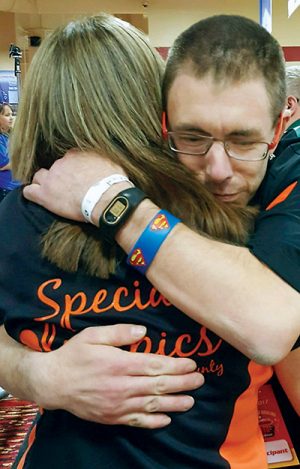
After finding out they had just won a silver medal in Unified Doubles at the 2017 Special Olympics National Bowling Tournament in Las Vegas, Special Olympian Sam Glessner hugs his doubles partner Cindy Denney. (Unified events team a Special Olympian with a parent or a volunteer.) Thirty-eight years ago, Denney, director of marketing at Jay County REMC, started volunteering with Special Olympics as a “hugger” at the finish line of races. She’s been volunteering as a coach, serving as a treasurer and fundraiser and anything else ever since … and still is giving and receiving hugs.
Photo provided by Jay County Special Olympics
Volunteers and ‘family’
When Jay County Special Olympics was looking for a volunteer who didn’t need much athleticism or training, Linda Hurst at the Jay/Randolph Developmental Services turned to someone she knew could perfectly fill the bill: her sister Cindy Denney, the jovial and exuberant director of marketing at Jay County REMC.
“They wanted someone to be a ‘hugger,’” recalled Denney. “A hugger was a person who was at the finish line. And when athletes crossed the finish line, the hugger gave them a hug and congratulated them. That’s how I got started — as a hugger. I think I’m a great hugger.”
Thirty-eight years later, Denney is still dishing out and receiving hugs at Special Olympics. And, she does so much more — as one of the almost 10,000 volunteers across Indiana who make the local programs go.
“A lot of our volunteers are involved all the time. They’re putting in as many as 20 hours a week,” said Nathan Barnes, manager of grants and communication at the state organization. “We have what we call ‘county management teams.’ That’s where Special Olympics is administered at the lower levels. The people who run those teams are all volunteers.”
Denney currently serves as treasurer for the Jay County team, and is a “glorified go-fer” heading to Seattle with Team Indiana. But over the years, she’s coached a variety of sports (including some she had to look up in the library), has teamed up in Unified events, and has gotten her family involved as well.
Allowing employees to take active roles as volunteers is one way local REMCs support Special Olympics. Many have also made donations to local teams through Operation Round Up grants and participated in fundraising efforts.
“One of the things that I love most about Special Olympics is the faces of the athletes,” Denney said. “Even when they compete, there’s joy. It doesn’t matter if they win or lose, they’re out there with friends, and they’re having a great time, and it shows on their faces. We have some athletes whose verbal skills are virtually nothing, but their smiles speak volumes,” she said.
Unlike many volunteers who become involved in Special Olympics because they have intellectually disabled family members or friends, Denney didn’t have a personal connection to Special Olympics — at least before she started as a hugger. Now, every Special Olympian she meets is a friend and family — which is how she describes her entire Special Olympics experience: “We are more than a team; we are family.”
Denney gets choked up easily talking about the Special Olympians she has come to know, coach and love. “I admire Special Olympic athletes because some of the things they have overcome to participate just floor me.
“They are my favorite athletes in the entire world,” she added. “To me, they are the Michael Jordans and the Lebron Jameses. They are ‘The Incredibles.’”
A long road … but not a lonely road
David Paul first came to Special Olympics through its equestrian events. He had started therapeutic horseback riding, and his mom, Cheryl Vogelsang, took him to the state equestrian games as an 11 year old 11 years ago. “His very first event, he got a gold medal. And we were hooked with Special Olympics,” Tim said.
Tim then entered David in bowling and coached him. David had such trouble walking around the campus for his first summer games, Tim recalled, he pushed him in a wheelchair.
Then, with an OK from David’s doctor, Tim began working with David on stretching and weightlifting. That regimen has made all the difference in David’s physical abilities. For the past five years, he’s been competing and excelling in powerlifting.
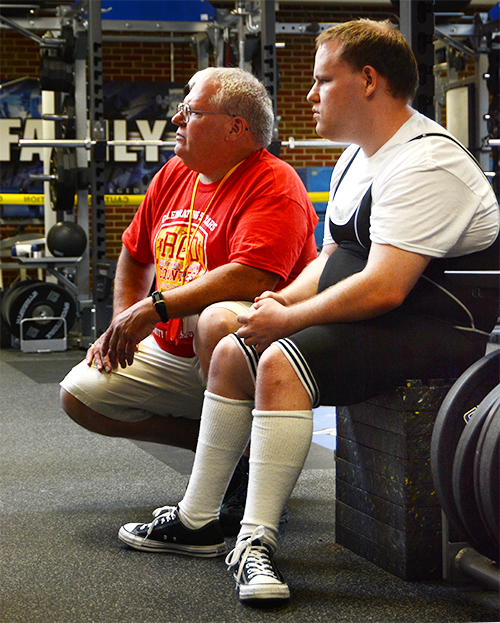
Tim and David watch other powerlifters compete at Indiana’s summer games at ISU in June. Photo by Richard G. Biever
“It doesn’t come over night. It’s been a long road. A lot of hours,” Tim said, reflecting on the strides his son has made. “There are times you just think, ‘Should I keep pushing? Should I give him a break?’ But then I see the results and where he’s at today. He’s working on his own now. He’s going to the USA games. He’s got friends on Facebook.”
One of his Facebook friends is a weightlifter from Tennessee, a college student with cerebral palsy. While this young man has no intellectual disability, he has almost no use of his legs. “His strength was all upper body,” Tim said. “Now, he’s seen David lifting with cerebral palsy, and he said, ‘Man, if he can do that, I can do that.’ And now, he is beginning to.”
The Milan miracle story of David Paul is every bit as much a story of a father’s love, dedication and advocacy for his son. It’s also a story of how Special Olympics has been there for 50 years to provide inspiration, a sense of purpose, and an unwavering international family of support for individuals much of society once brushed aside.
“Special Olympics is a wonderful organization. We just needed a platform to touch other lives. That’s our goal,” said Tim. “I know how hard it is when someone tells you your kid has cerebral palsy. I want those other families to see what David’s done. He was in that same boat that they are now in. We just say, ‘Hey, there is hope.’”
Tim said there are days he wonders where David would be if not for Special Olympics. “As a dad, I would’ve worked with him as best I could, but I don’t think we’d be where we’re at today.”
RICHARD G. BIEVER is senior editor of Electric Consumer.
Click here to read an account of David Paul’s personal journey written by his dad, Tim Paul.
Special Olympics: A Kennedy legacy
The Special Olympics movement was founded in 1968 by Eunice Kennedy Shriver. A sister of President John F. Kennedy and Sen. Robert F. Kennedy, Shriver saw firsthand the struggles and mistreatment of their intellectually disabled sister, Rosemary. She saw how people with intellectual disabilities were excluded from society and routinely removed to custodial institutions, and she decided to focus much of her life on making their lives better.

Eunice Kennedy Shriver looks over the first International Special Olympics Summer Games at Chicago’s Soldier Field, July 20, 1968.
Photo courtesy of Special Olympics
Shriver, a collegiate athlete, knew that sports could be a common ground to unite people from all walks of life. And what became Special Olympics began as a day camp for people with intellectual disabilities at her Maryland farm in 1962.
The first International Special Olympics Games, organized as a joint venture between the Kennedy Foundation and the Chicago Park District, were held at Soldier Field, July 20, 1968. Nearly 1,000 athletes, including 80 from Indiana, marched into a nearly empty stadium. By the close of the games, though, Chicago Mayor Richard Daly leaned to Shriver and said, “The world will never be the same.”
Shriver maintained close ties to Special Olympics during the next 40 years. She died in 2009 at age 88.
1968: Triumph amid tragedy
Less than two months before the first Special Olympics games in Chicago in July 1968, Shriver’s brother Sen. Robert F. Kennedy was assassinated in Los Angeles. He was shot just moments after making his victory speech upon winning the California Democratic presidential primary. His last words to the crowd that night: “And now it’s on to Chicago, and let’s win there.”
“On to Chicago” referenced the Democratic National Convention to be held there in August 1968. With his death, the words bittersweetly instead prophesied his sister’s Special Olympics movement — which won over hearts and minds, and changed the world for so many.
Special Olympics: At a Glance
Based in Indianapolis, Special Olympics Indiana coordinates all aspects of the program in the state. In addition to conducting a schedule of annual competition events throughout the year, the state office manages fundraising, public relations, coaches’ training, volunteer registration, the 10 area and 71 county programs, outreach and general administration.
• AREA 1: Elkhart, Jasper, Lake, LaPorte, Marshall, Newton, Porter, St. Joseph, Starke;
• AREA 2: Bartholomew, Brown, Clark, Crawford, Floyd, Harrison, Jackson, Jefferson, Jennings, Orange, Scott, Switzerland, Washington;
• AREA 3: Adams, Allen, DeKalb, Huntington, LaGrange, Noble, Steuben, Wells, Whitley;
• AREA 4: Benton, Carroll, Clinton, Fountain, Montgomery, Parke, Putnam, Tippecanoe, Vermillion, Warren, White;
• AREA 5: Cass, Fulton, Howard, Kosciusko, Miami, Pulaski, Tipton, Wabash;
• AREA 6: Blackford, Delaware, Grant, Henry, Jay, Madison, Randolph;
• AREA 7: Clay, Daviess, Greene, Knox, Lawrence, Martin, Monroe, Owen, Sullivan, Vigo;
• AREA 8: Boone, Hamilton, Hancock, Hendricks, Johnson, Marion, Morgan;
• AREA 9: Dearborn, Decatur, Fayette, Franklin, Ohio, Ripley, Rush, Shelby, Union, Wayne;
• AREA 10: Dubois, Gibson, Perry, Pike, Posey, Spencer, Vanderburgh, Warrick.
PARTICIPATION
To be eligible to compete in Special Olympics, an individual must be 8 years of age or older AND have been identified by an agency or professional as having an intellectual disability or closely related developmental disability. For those under age 8, the Unified Champion Schools program is available.
SUPPORT
Special Olympics Indiana is a nonprofit organization and receives no federal or state funds, and relies entirely on corporate, civic and individual donations.
EVENTS THIS MONTH
• 2018 Special Olympics USA Games will be held in Seattle, July 1-6. Some 3,500 athletes from across the United States will compete in 14 sports. Team Indiana will consist of 78 members (40 athletes, 14 Unified partners, 15 coaches and nine support staff).
• Special Olympics 50th Anniversary Celebration will be held in Chicago, July 17-21, at various venues.
ive decades after the spark that became today’s Special Olympics movement was ignited at the first 1968 International Summer Games in Chicago, a year-long global anniversary celebration begins. Most events are free. For a schedule and information, visit: https://www.specialolympics.org/50th.aspx.
TO LEARN MORE OR MAKE A DONATION
Contact Special Olympics Indiana at: 317-328-2000 or 800-742-0612; or visit its website: SOIndiana.org.
To learn more about Special Olympics in general, please visit SpecialOlympics.org.
Let the Games begin!
The Special Olympics Indiana Summer Games are a special sight to see — especially the colorful Opening Ceremony when all the athletes and volunteers march into Hulman Center at Indiana State University representing the different counties and areas. Here are just a few photos from this year’s opening event.
